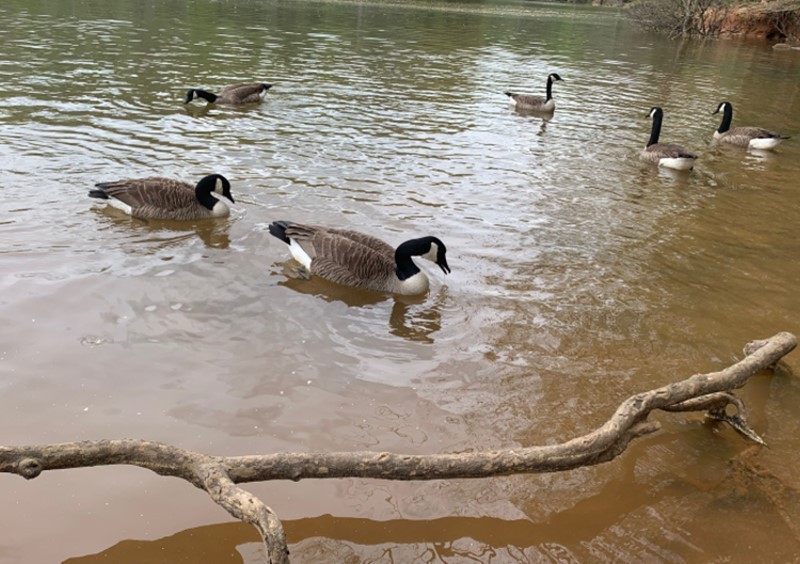As it gets closer to swimming weather on Lake Lanier, visitors need to be aware that they'll be sharing the water with wildlife - specifically Canada geese - and there are some health hazards that come with that.
Don McGowan, Regional Supervisor for the Georgia Department of Natural Resources - Wildlife Resources Division, said the Canada geese in the Southeastern United States - including those around Lake Lanier - never really leave the area.
"They've lost their migratory tendency and they pretty much stay year round," McGowan said in a recent interview with AccessWDUN. "Now, in the fall and winter, they will move around in large flocks, but this time of year...they start to break up into smaller groups and pairs for nesting."
Of course, with nests come goslings, and that means even more geese around Lake Lanier. McGowan estimates the Canada goose population is well into the thousands around the lake.
"It's a population that's grown steadily over the last two to three decades," McGowan said. "They are very resilient, they can adapt to many types of settings and they're doing well as far as their population is concerned. They're getting to the point in some areas to be a problem as far as [being] a pest goes."
McGowan said he's not qualified to speak directly to the public health aspect of how Canada geese impact water quality, but he said he is well aware that droppings from the birds have created issues with bacteria and contamination. And, because the birds have become accustomed to people who use the lake, they don't leave an area just because people are nearby.
Officials with the non-profit Chattahoochee Riverkeeper do have the qualifications necessary to assess the water quality on Lake Lanier and its tributaries, and they said while Lake Lanier is a clean body of water for the most part, there are sources of fecal coliform all over the watershed, including in the beach areas.
"One of our main messages to people is to stay out of the water after rain events because that's when stormwater runoff has potential to pose harm to people swimming in the lake," said Dale Caldwell, Headwaters Director for Chattahoochee Riverkeeper. Caldwell said some of the pollutants come from industry or pesticides, but certainly the droppings of the geese contribute to the problem.
Jason Ulseth, Riverkeeper for Chattahoochee Riverkeeper, agrees with Caldwell's assessment.
"At Chattahoochee Riverkeeper we have started testing at highly-recreated beaches during warmer months when people are actually getting in the lake," Ulseth said. "Typically we see very low numbers of fecal coliform bacteria and E. coli in pretty much all of our sample sites except for following a heavy rain or areas where we see large amounts of geese congregating. So, if you do see large amounts of geese congregating near a beach, we do suggest that you do avoid contact with that water."
Ulseth said he has heard suggestions about how to quickly alert the public when contaminant numbers are high in a specific area, but the current technology does not allow for a "real time" alert system.
"The fastest-available technology for turnaround time on E. coli is 18 hours," Ulseth said. "We always know what E. coli levels were yesterday, but we can never know what the levels are in real time. Based off of our data for the last couple of years, there have been several instances of beach closures due to high levels of E. coli detected in a beach sample which we attributed to high [numbers] of geese that were congregating in the immediate area, but unfortunately, there's not a test that we can go out and test it right now and then close a beach because E. coli levels are high."
Chattahoochee Riverkeeper is not the only entity that tests the water in Lake Lanier. For example, the City of Gainesville Water Resources Department will sample the water at the beach at River Forks Park and Campground, which is a Hall County park. The lab staff determines when and how often the samples are pulled, according to Mike Little, Director of Hall County Parks & Leisure.
"Generally, the beach water is sampled on a bi-weekly basis beginning mid-May with the results being emailed and called in to the appropriate personnel at Hall County Parks & Leisure," Little said in an email statement. "Should the sample results come back at higher elevated levels (regardless if it is still below the state guidelines), they are analyzed to determine whether it is safe to have the beach water open to the public. In some cases, additional testing is completed to aid in determining the status of a closure."
Once officials call for the beach to close, then signs are posted at the beach and visitors who enter the park are told about the closure by park staff. If the situation is deemed serious enough, then Little said media will be notified of the closure.
That means beach visitors have to somehow educate themselves before they swim or wade in the shallower water around the Lake Lanier shoreline, according to Ulseth.
"I think that there's more that can be done, particularly around these public access areas," Ulseth said. "Typically, Lake Lanier is a very clear, cold, deep, clean lake. Most of our samples do come back at a very low level for E. coli - safe for recreation."
However, Ulseth repeated that when heavy rains have fallen or geese are congregating, then people need to be more cautious.
"People need to be aware that in those cases, they are going to have an elevated risk, especially if they're young or old or immunocompromised or if they have open sores or wounds that would be exposed to that water," Ulseth said. "Wherever you are - on any body of water - that is not going to be 100% pure water, so you always need to exercise caution."
ADDITIONAL RESOURCES
Follow this link for an article from Georgia DNR-Wildlife Resources Division on preventing Canada geese from becoming a nuisance.
Follow this link to find out more about Chattahoochee Riverkeeper's water quality monitoring efforts.
Follow this link for an article from AccessWDUN on a Gainesville family whose toddler died after he was exposed to E.coli in Lake Lanier.










